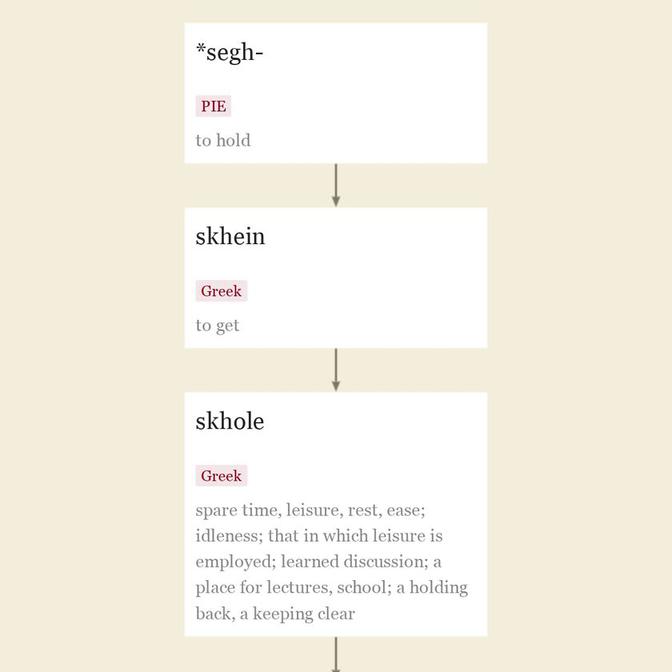Entries linking to preschool
[place of instruction] Middle English scole, from Old English scol, "institution for instruction," from Latin schola "meeting place for teachers and students, place of instruction;" also "learned conversation, debate; lecture; disciples of a teacher, body of followers, sect," also in the older Greek sense of "intermission of work, leisure for learning."
This is from Greek skholē "spare time, leisure, rest, ease; idleness; that in which leisure is employed; learned discussion;" also "a place for lectures, school;" originally "a holding back, a keeping clear," from skhein "to get" (from PIE root *segh- "to hold") + -olē by analogy with bolē "a throw," stolē "outfit," etc.
The basic sense of the Greek word is "leisure," which passed to "otiose discussion" (in Athens or Rome, the favorite or proper use of free time), then it came to be used for the place for such discussion.
The Latin word was widely borrowed (in addition to Old French escole, French école, Spanish escuela, Italian scuola; Old High German scuola, German Schule, Swedish skola, Gaelic sgiol, Welsh ysgol, Russian shkola).
The meaning "students attending a school" in English is attested from c. 1300; the sense of "school building" is by 1590s. Sense of "people united by a general similarity of principles and methods" is from 1610s; hence school of thought (by 1848). As an adjective by mid-18c., "pertaining to or relating to a school or to education."
School of hard knocks "rough experience in life" is by 1870; to tell tales out of school "betray damaging secrets" is from 1540s. School-bus is from 1908. School days is from 1590s. School board "local committee of education" is by 1836; school district "division of a town or city for the management of schools" is by 1809.
word-forming element meaning "before," from Old French pre- and Medieval Latin pre-, both from Latin prae (adverb and preposition) "before in time or place," from PIE *peri- (source also of Oscan prai, Umbrian pre, Sanskrit pare "thereupon," Greek parai "at," Gaulish are- "at, before," Lithuanian prie "at," Old Church Slavonic pri "at," Gothic faura, Old English fore "before"), extended form of root *per- (1) "forward," hence "beyond, in front of, before."
The Latin word was active in forming verbs. Also see prae-. Sometimes in Middle English muddled with words in pro- or per-.
Trends of preschool
More to Explore
updated on October 23, 2020
Dictionary entries near preschool
presbycousis
presbyopia
presbyter
Presbyterian
presbytery
preschool
prescience
prescient
prescientific
prescreen
prescribe

